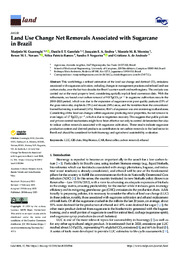Land use change net removals associated with sugarcane in Brazil.
Land use change net removals associated with sugarcane in Brazil.
Author(s): GUARENGHI, M. M.; GAROFALO, T. F. T.; SEABRA, J. E. A.; MOREIRA, M. R. M.; NOVAES, R. M. L.; RAMOS, N. P.; NOGUEIRA, S. F.; ANDRADE, C. A. de
Summary: This work brings a refined estimation of the land use change and derived CO2 emissions associated with sugarcane cultivation, including changes in management practices and refined land-use carbon stocks, over the last two decades for Brazil?s center?south and north regions. The analysis was carried out at the rural property level, considering spatially explicit land conversion data. With the refinements, we found a net carbon removal of 9.8 TgCO2∙yr−1 in sugarcane cultivation areas in the 2000?2020 period, which was due to the expansion of sugarcane over poor quality pastures (55% of the gross removals), croplands (15%) and mosaic (14%) areas, and the transition from the conventional burned harvesting to unburned (16%). Moreover, 98.4% of expansion was over existent agricultural areas. Considering all the land use changes within sugarcane-producing rural properties, the net removal is even larger, of 17 TgCO2∙yr−1, which is due to vegetation recovery. This suggests that public policies and private control mechanisms might have been effective not only to control deforestation but also to induce carbon removals associated with sugarcane cultivation. These results indicate sugarcane production system and derived products as contributors to net carbon removals in the land sector in Brazil and should be considered for both bioenergy and agricultural sustainability evaluation.
Publication year: 2023
Types of publication: Journal article
Unit: Embrapa Environment
Observation
Some of Embrapa's publications are published as ePub files. To read them, use or download one of the following free software options to your computer or mobile device. Android: Google Play Books; IOS: iBooks; Windows and Linux: Calibre.
Access other publications
Access the Agricultural Research Database (BDPA) to consult Embrapa's full library collection and records.
Visit Embrapa Bookstore to purchase books and other publications sold by Embrapa.

